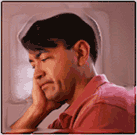Depression in Men: How Is It Different?
When some of us think of depression, we may think that women experience it more than men. Some health professionals say this is because women experience hormonal changes during menstruation, pregnancy, childbirth, and menopause, which may both contribute to depression and complicate its treatment. But are men really less likely than women to get depressed, or are they just less likely to acknowledge it?
Depression in Men
To deal with male depression, we need to understand how it differs from female depression. Whether it is because some men are ashamed to admit they have a mental condition or they just are not as attuned to their mental health as women, symptoms of depression should not be ignored. Women may be more likely to have anxiety in association with their depression, while men are more likely to exhibit signs of substance abuse or conduct disorder. Some evidence indicates that depression may be even more dangerous for men than for women. Men are more likely than women to commit suicide, although women are more likely to attempt suicide. To make matters worse, many men may shy away from talking about their feelings, asking for help, and seeking treatment for depression.
Perhaps one of the reasons male depression may go undiagnosed is that men fear the repercussions of admitting they have a mental illness. They may be concerned that their coworkers, friends, and family would look down on them if they sought help for depression. Also, they may fear that their job security, promotion potential, and health benefits would be negatively affected if their coworkers or boss found out they were depressed.
Symptoms of Depression
 The National Institute of Mental Health (NIMH) says the following symptoms are common in depression, regardless of gender:
The National Institute of Mental Health (NIMH) says the following symptoms are common in depression, regardless of gender:
- Persistent sad, anxious, or “empty” mood
- Feelings of hopelessness and pessimism
- Feelings of guilt and worthlessness
- Loss of interest or pleasure in hobbies and activities that were once enjoyed, including sex
- Decreased energy and increased fatigue
- Difficulty concentrating, remembering, and making decisions
- Insomnia, early-morning awakening, or oversleeping
- Appetite and/or weight loss or overeating and weight gain
- Recurrent thoughts of death and/or suicide, suicide attempts
- Restlessness and irritability
- Persistent physical symptoms that do not respond to treatment, such as headaches, digestive disorders, and chronic pain
These symptoms can appear in both men and women who are depressed and it is important to recognize them if they occur. Even symptoms that may seem like another illness coming on—headaches, digestive disorders, and chronic pain—may be associated with depression.
Depressed men may be less likely to experience sadness, worthlessness, and guilt as symptoms of depression. They do, however, commonly experience fatigue, irritability, anger, loss of interest in relationships, decreased interest in hobbies, excessive time spent at work, and sleep disturbances. They may show frustration and discouragement, and become irritable, angry, or sometimes abusive. The more we find out about how depression differs between men and women, the better health professionals will become at recognizing and treating this condition in men.
Getting Help
If you think you may be depressed, schedule a visit with your physician. It is possible that another condition—such as an infection, a thyroid disorder, or low testosterone—is causing you to feel depressed. Sometimes when these conditions are treated, your symptoms will disappear. If your physician determines that your symptoms are not caused by another condition, you will likely undergo a psychological evaluation for depression, either by your physician or a referred mental health professional.
During a psychological evaluation, the doctor will ask you about your symptoms, your drug and alcohol use, whether or not you have had thoughts of death and suicide, and if depressive disorders run in your family. Also, the doctor will assess your mental status, including your speech, thought patterns, and memory.
Depending on your diagnosis, treatment for depression may include a combination of medications, psychotherapies, and other therapies to help alleviate symptoms of depression.
In addition to your prescribed therapy, the NIMH suggests you incorporate the following strategies into your life to help cope with depression:
- Participate in mild exercise.
- Go to the movies, ball games, or other social activities.
- Set realistic recovery goals.
- Make it a point to be around people.
- Find someone to confide in.
- Expect your mood to improve gradually, not overnight.
- Postpone important decisions, such as job changes or changes in your marital status, until your depression has lifted.
- Allow your family and friends help you cope with depression.
It is important for men to understand that depression is a disease of the brain, not a sign of weakness. Depression can be successfully treated, and seeking treatment can improve the quality of life of any man who is depressed, as well as those close to him.
REFERENCES:
Depression can differ in men and women. National Institutes of Health (NIH) website.
How can I help myself if I am depressed? NationalInstituteofMental Healthwebsite.
How do men experience depression? NationalInstituteofMental Healthwebsite.
What are the signs and symptoms of depression? NationalInstituteofMental Healthwebsite.





